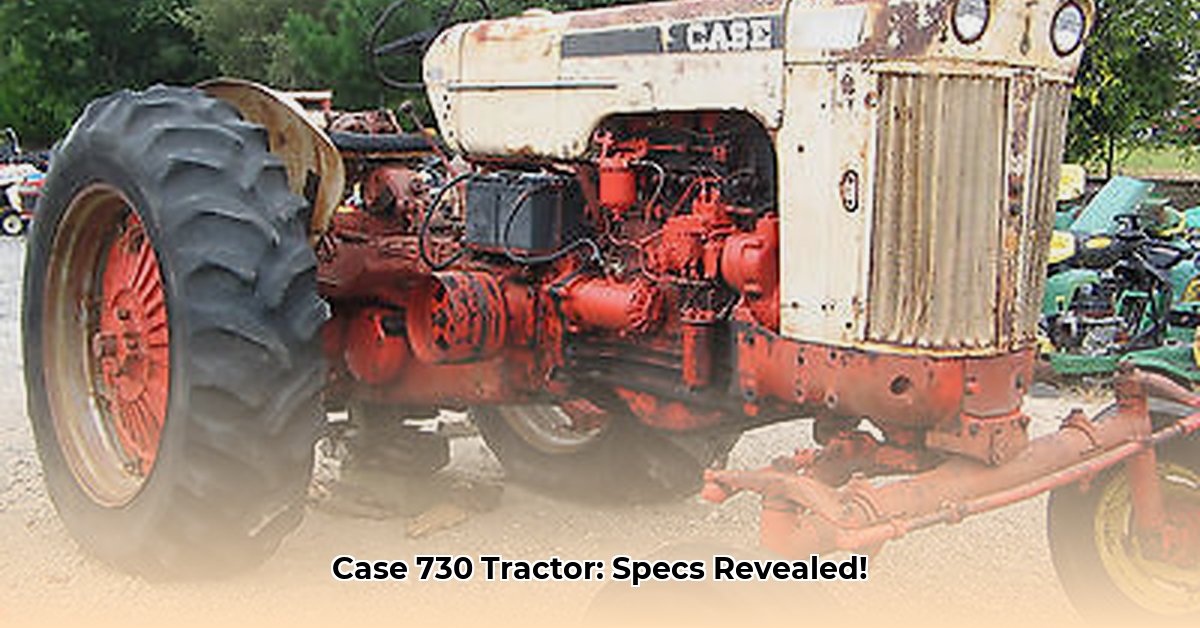
Case 730 Tractor Specifications: A Detailed Overview
The J.I. Case 730 series, a stalwart of agricultural machinery in the 1960s, represents a pivotal point in the mechanization of farming. This in-depth guide explores the technical specifications, variations, and historical context of this iconic tractor, providing a comprehensive resource for enthusiasts, historians, and engineers alike. Understanding the Case 730's specifications requires examining multiple sources, as precise documentation from that era is limited. However, by carefully cross-referencing the available information, we can construct a robust and reliable overview. For additional images and information on similar models, check out this Case toy tractor site.
Powertrain: Engine and Transmission
The Case 730 series featured a robust four-cylinder diesel engine, typically displacing 4.4 liters (4375 cubic centimeters). This powerplant generated approximately 56 horsepower (around 41.8 kW at the PTO). Slight variations in reported horsepower figures across different sources are likely due to differing testing methodologies. Isn't it interesting how even in such a seemingly standardized aspect as horsepower, variations exist across different sources or measurement methodologies?
Power transmission was achieved through two primary options: an 8-speed torque converter transmission (automatic) or an unsynchronized manual gearbox. The torque converter offered a smoother, more user-friendly driving experience, making it ideal for less experienced operators. The manual gearbox, while requiring more operator skill, provided more direct control and potentially greater fuel efficiency. Did you know that the choice between automatic and manual transmissions dramatically alters the driving feel and operator skill requirements? The fuel capacity of the Case 730 was approximately 117.3 liters (31 US gallons), providing ample capacity for extended work sessions.
Variants: Tailored for Specific Applications
The Case 730 was far from a one-size-fits-all machine. Case offered several variants (approximately ten models numbered 730 through 734 and 740 through 744), each tailored to specific agricultural tasks. This adaptability highlights the manufacturer's commitment to meeting diverse farming needs.
| Model | Specialty | Ideal Use |
|---|---|---|
| 730 | Standard | General farm tasks |
| 730 High Clearance | High ground clearance | Low-profile crops (tobacco, etc.) |
| 730 Row Crop | Designed for row crop cultivation | Crops planted in rows (corn, soybeans, etc.) |
| 730 Orchard | Optimized for orchards | Working within tight orchard spaces |
| 730 Western Special | Features for western farming | Ranching and open-field operations |
| 740 - 744 | Enhanced power and features | Similar to above but with increased power |
The precise specifications of each variant, such as weight and dimensions, varied slightly but the core engine designs remained consistent. Did you know the subtle differences between these models enabled farmers to optimize their operations for diverse crop types and farming practices?
Historical Context: A Legacy of Innovation
The Case 730's production run (approximately 1960-1969) coincided with a period of rapid agricultural mechanization. Its design and capabilities reflect the technological advancements of that era. The tractor's role within Case's product line contributed significantly to the company's reputation for quality agricultural machinery. The Case 730 was more than just a machine; it was a symbol of agricultural progress. What better testament to a product’s success than enduring popularity amongst collectors and farmers alike?
Conclusion: An Enduring Legacy
The Case 730 series remains an important landmark in agricultural history, demonstrating robust engineering and adaptability to a wide range of farming practices. While precise data sources are limited due to the age of the machinery, careful analysis of available information provides a comprehensive understanding of its specifications and historical significance. The tractor's enduring legacy is a testament to its robust design and enduring appeal to generations of farmers.